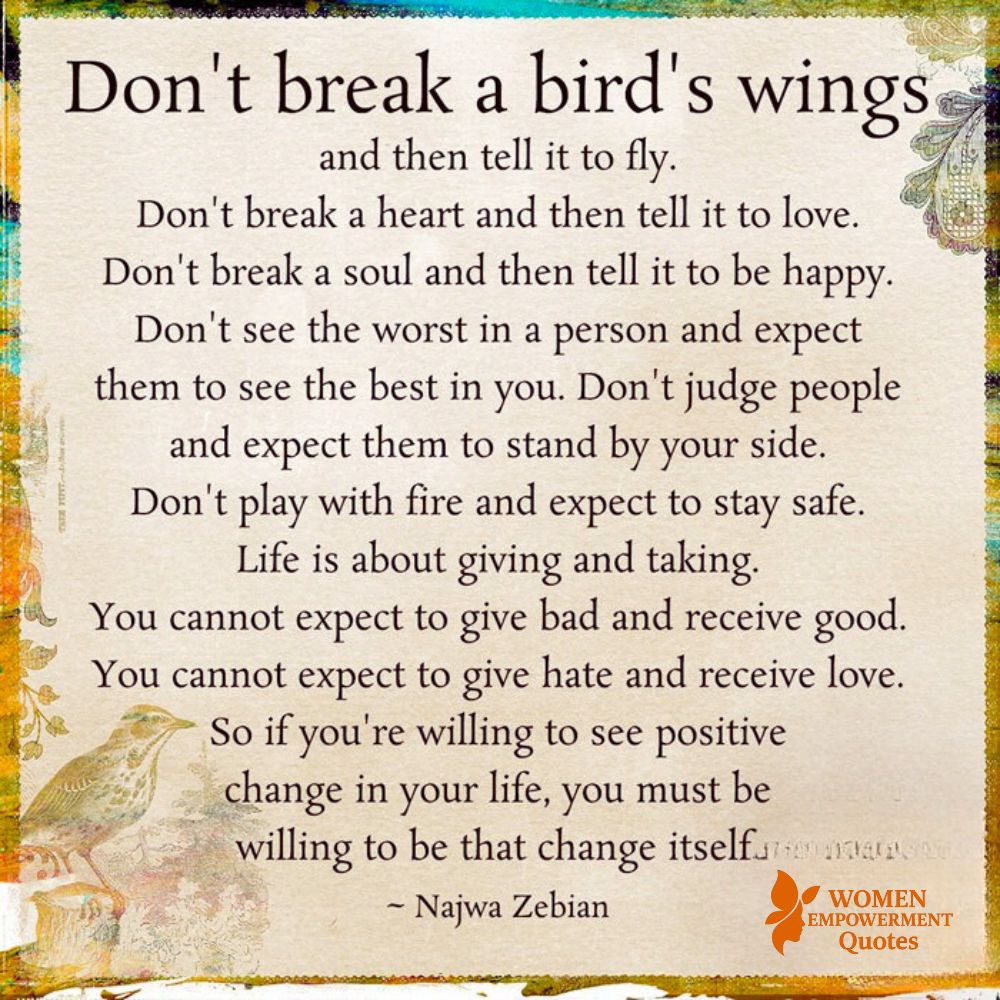
The Gentle Strength of Empathy: How Compassion Heals and Uplifts
Najwa Zebian’s powerful words remind us of something deeply human: we hold great influence over the emotional well-being of others. Our actions and attitudes, however small, can either uplift or wound. Her metaphor—a bird with broken wings being told to fly—paints a vivid image of the pain caused by careless or harsh treatment, and the injustice of expecting strength where we’ve contributed to weakness.
Imagine a fragile bird, its wings injured by neglect or cruelty. It cannot fly. Likewise, when people are hurt—by criticism, betrayal, or indifference—they can feel trapped in pain, unable to move forward. Healing doesn’t come from demand; it arises from patience, kindness, and the consistent presence of someone who cares.
Human connection is both delicate and powerful. Every interaction is a choice: we can nurture growth or contribute to harm. When we fixate on the worst in others, we create distance and distrust. But when we choose to see their potential—especially when they cannot see it themselves—we become part of their healing. In this way, compassion becomes not just a feeling, but a force for restoration.
Judgment is easy. Compassion is harder—but far more powerful. True allies do not stand in judgment when we stumble. They walk beside us, offering grace in our imperfection. Through understanding, we create the emotional safety needed for people to heal and grow into their fullest selves.
Personal transformation always begins within. We cannot expect love, support, and empathy from the world if we are unwilling to give them first. The energy we share returns to us, reflected through the hearts we’ve touched.
Zebian’s words aren’t just poetic—they are a call to action. They ask us to be tender in a world that often rewards toughness. They ask us to lead not with criticism but with care, not with dominance but with understanding. When we do, we become agents of healing—not only for others but for ourselves.
Empathy in Leadership: Influence Rooted in Humanity
In a society that often measures success by control, status, or material gain, Zebian urges us to rethink what it truly means to lead. Real influence doesn’t stem from power—it comes from presence. From the ability to truly see others, to honor their pain, and to help them rise, even when their wings are still healing.
Empathy builds the kind of trust no authority can command. When people feel seen and understood, they begin to believe in themselves again. They open up. They grow. And from that space of safety, they are able to contribute, create, and soar.
The most impactful leaders are not those who demand, but those who serve. They create environments where people feel respected and empowered, not judged and afraid. They understand that emotional safety is the soil in which potential grows.
Growth takes time. Healing takes care. And change, real change, begins not with systems or policies, but with how we treat each other.
Let empathy guide you. Let compassion lead you. Be the one who mends the wings, not the one who breaks them.
Relevant Quotes That Echo This Truth:
-
“We must always take sides. Neutrality helps the oppressor, never the victim.” – Elie Wiesel
-
“You cannot shake hands with a clenched fist.” – Indira Gandhi
-
“He who passively accepts evil is as much involved in it as he who helps to perpetrate it.” – Martin Luther King Jr.
-
“Injustice anywhere is a threat to justice everywhere.” – Martin Luther King Jr.
-
“The seed of revolution is repression.” – Woodrow Wilson